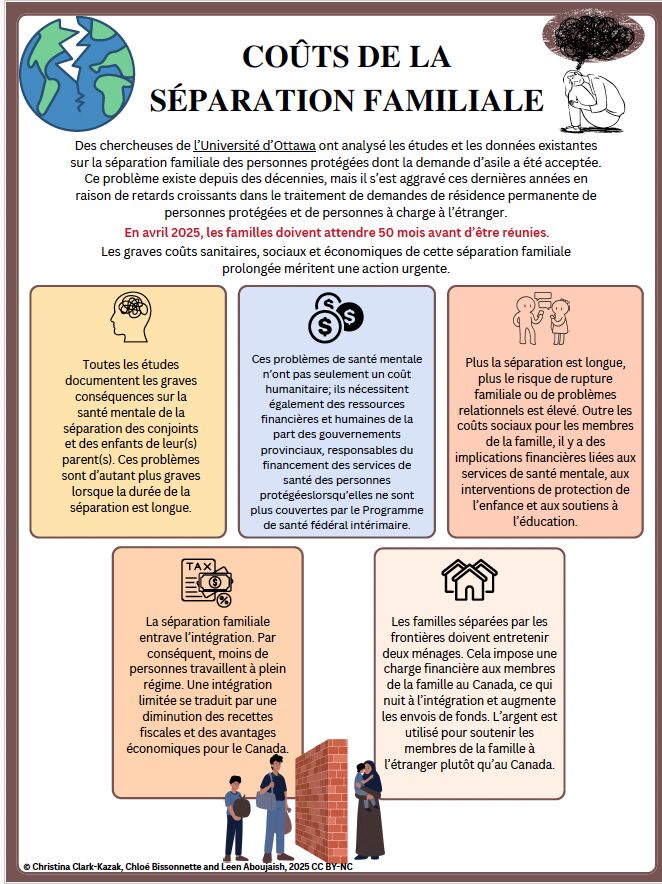Foire aux questions : plaidoyer en faveur de la réunification familiale
Une fois sa demande d’asile acceptée au Canada, une personne réfugiée (appelée « Personne protégée) peut demander la résidence permanente pour elle-même et pour sa famille immédiate (conjoint-e et enfants). Les membres de la famille qui se trouvent à l’étranger doivent attendre que leur demande de résidence permanente soit traitée avant de se rendre au Canada. Cela prend de nombreuses années.
Des permis de séjour temporaire (PST) devraient être délivrés aux membres de la famille des personnes réfugiées, afin qu’ils puissent vivrent au Canada en attendant le traitement de leur demande de résidence permanente.
Combien de temps les familles attendent-elles d’être réunies?
Selon le gouvernement, les membres de la famille à l’étranger attendent plus de quatre ans (50 mois) à compter de la date de la demande de résidence permanente de la personne protégée au Canada (leur parent ou leur conjoint-e). Voir les délais de traitement.
Les délais devraient augmenter considérablement. Une personne protégée qui présente une demande de résidence permanente en décembre 2025 est informée que le traitement de sa demande prendra 100 mois (plus de 8 ans) (si elle se trouve au Québec, ce délai est de 106 mois). Le délai sera encore plus long pour les membres de la famille qui vivent à l’étranger.
Combien de personnes sont concernées?
En décembre 2025, il y a, selon IRCC, 141 300 personnes qui attendent la résidence permanente en tant que personnes protégées. On ignore combien de membres de leur famille à l’étranger sont actuellement en attente, mais en avril 2024, ils étaient 42 000.
Pourquoi les délais de traitement sont-ils si longs?
Le nombre de personnes protégées et de membres de leur famille qui reçoivent la résidence permanente chaque année est déterminé par l’objectif fixé par le gouvernement dans le cadre des niveaux d’immigration (20 000 personnes protégées et membres de leur famille en 2026).
Ces dernières années, le nombre de personnes acceptées en tant que réfugiées a augmenté, mais l’objectif a été revu à la baisse. Chaque année, donc, le nombre de personnes qui demandent la résidence permanente est supérieur à celui des personnes qui l’obtiennent, et l’arriéré ne cesse de croître.
Quel sera l’impact de l’initiative spéciale pour les personnes protégées?
En novembre 2025, le gouvernement a annoncé une excellente initiative visant à accorder la résidence permanente à 115 000 personnes protégées d’ici la fin de 2027. Cela donne un peu d’espoir aux personnes qui attendent depuis des années la réunification familiale.
Cependant, cette initiative est destinée aux personnes qui se trouvent déjà au Canada, de sorte que ses implications pour les membres de la famille à l’étranger ne sont pas claires. Et la mesure ne suffira pas à répondre à toutes les personnes protégées actuellement en attente.
Les objectifs restent donc largement insuffisants par rapport au nombre de personnes qui présentent une demande. En 2025 (de janvier à septembre), 37 000 personnes ont vu leur demande acceptée par la CISR, mais l’objectif pour 2026 n’est que de 20 000.
Quelles sont les conséquences d'une séparation familiale prolongée?
Les enfants, en particulier, souffrent beaucoup de la longue attente. Ils peuvent
- vivre dans une situation de conflit ou d'insécurité
- être déplacés de leur domicile et vivre avec un statut précaire ou sans statut
- avoir un accès limité aux soins de santé
- ne pas pouvoir aller à l'école régulièrement
- être traumatisés par la séparation forcée d'avec leurs parents.
Les parents au Canada qui attendent d'être réunis avec leurs enfants souffrent également. Souvent, ils
- peinent à poursuivre leur vie au Canada, car ils ont l'esprit tourné vers leur famille à l'étranger
- doivent envoyer de l'argent à l'étranger pour subvenir aux besoins de leur famille
- vivent avec un sentiment de culpabilité parce qu'ils ne sont pas en mesure de protéger leurs enfants
- éprouvent des problèmes de santé mentale et physique en raison du stress.
Quel est le coût d'une séparation familiale prolongée?
La recherche menée par Christina Clark-Kazak, professeure à l'université d'Ottawa, avec Chloé Bissonnette, montre les coûts humains, sociaux, sanitaires et financiers dévastateurs de la séparation familiale pour les demandeurs d'asile acceptés, leurs familles et tous les niveaux de gouvernement. Le rapport intégral est disponible ici : Coûts de la séparation familiale à la suite de demandes d’asile acceptées au Canada. Les principaux résultats sont résumés dans l'infographie ci-dessous (merci à Leen Aboujaish pour l'infographie).

Quelle est la solution?
Une solution temporaire consisterait à délivrer des permis de séjour temporaires aux membres de la famille à l’étranger, comme recommandé par l’Association du Barreau canadien et le Conseil canadien pour les réfugiés (voir la lettre d’avril 2024). À plus long terme, une solution plus permanente est nécessaire.
Quelles sont les implications financières de la solution proposée?
Les coûts administratifs liés à la délivrance de permis de séjour temporaire aux membres de la famille seraient faibles.
En revanche, la mesure entraînerait des avantages financiers importants :
- Le système judiciaire réalisera des économies, car les familles n'auront plus besoin de demander à la Cour fédérale d'intervenir pour accélérer le traitement de leur dossier
- Les familles réunies seront plus fortes économiquement.
- Les réfugiés n'auront plus besoin d'envoyer de l'argent à l'étranger à leur famille proche.
- Les coûts d'une réunification tardive pour les systèmes sociaux et de santé du Canada seront réduits.
Fichiers joints
- Documentrfr-plaidoyer-faq.pdf (170.99 Ko)